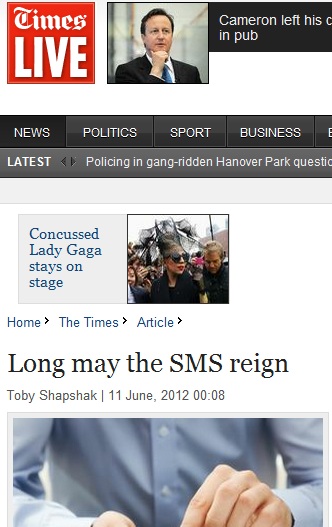 The launch of FrontlineSMS Version 2 featured in the Times LIVE on Monday 11th June 2012. See an extract below and read the full piece online here.
The greatest communication mechanism in the world is arguably still SMS - the short message service sent over cellphones...
The launch of FrontlineSMS Version 2 featured in the Times LIVE on Monday 11th June 2012. See an extract below and read the full piece online here.
The greatest communication mechanism in the world is arguably still SMS - the short message service sent over cellphones...
One of the most remarkable communications platforms is FrontlineSMS, which lets grassroots users and NGOs communicate by SMS.
It was founded by Ken Banks after a trip to the Kruger National Park in 2004 and has since gone global. It has a number of spin-off projects aimed at providing educational, legal and medical advice, and offers mobile money management.
"Mobile is everywhere. If you could use it to organise and put it in the hands of community organisations, who know what they want to do with it, they could use it," said Laura Walker Hudson, CEO of the foundation that provides the open-source FrontlineSMS software.
"So we hear every second Tuesday about how SMS is dead and will be dead by 2015, and how this is linked to the rise of mobile data," said Walker Hudson, who is based in Nairobi, Kenya.
"But there are places where the only communication you can receive is by SMS. The most vulnerable people in society are still using low-end handsets, and SMS is still the most powerful" form of communication.
"It's very direct and engaging," she said, and people understand how much it costs them.
"It's very intimate because you get the message straight to a person, which makes it more powerful than e-mail."
FrontlineSMS has grown significantly since I first saw it a year ago. Version 2 of the software will launch tomorrow with a whole new range of features that will make it even more useful.
Interestingly, FrontlineSMS's parent organisations use what's known as a hybrid structure so it can have both for-profit and not-for-profit services. By charging organisations that can pay for the services, it is able to provide it for communities who can't.
The ubiquity of SMS means other services can be built on top of it, such as the mobile payment system that has become synonymous with Kenya's mobile success, M-Pesa.
Cellphones have become the most-used devices in the world, having long since overtaken computers and are growing at exponential rates, with remarkable results.
New communication technologies have always brought great change to the world. It started with the printing press, the telegraph and the telephone. They were the analogue precursors to the telephone network, the internet and now cellphones.
They are evolving into smartphones but the vast majority of people still use them for their primary functions: voice calls and text messaging.
SMS is still the king of communication.
Long may it reign.
This article was featured in The Times LIVE. You can read the original version here.
